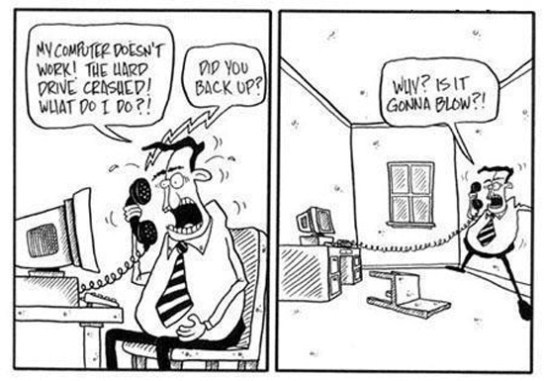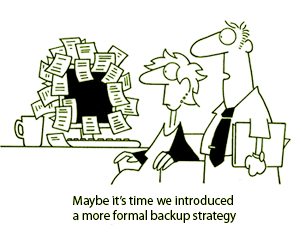Legend of international avos
The recognized master of backup is a lizard. Rejecting her tail under force majeure circumstances, she soon grows a new one. This is evolutionarily laid by nature and does not require special efforts from an amphibian. Separate phenomena of recovery of organs or cells are found in other animals, including homo sapiens. However, today the situation has changed and a person, unlike a lizard, has another significant value - information, namely, the data that he carefully collected, has accumulated, and ... But what happens to them further depends on how homo corresponds to the title sapiens. As you may have guessed, not all correspond. Not for nothing, coined World Backup Day, which is celebrated just today.

The results of the competition inside!
And it’s certainly not for nothing that the International Day of Backup is celebrated on the eve of April 1, when everyone can be fooled. By the way, at the beginning of April, there is a surge in attacks and cybercrimes - the dark forces of the Internet test the world for strength and, unlike Santa Claus, come to bad and disorderly boys and girls. And also to companies, corporations and data centers. And one could breathe about Russian, perhaps, but this problem has a global reach.
 We always carefully prepare for World Backup Day. For example, last year we conducted a global survey, according to which over 75% of consumers store their personal data in digital format. More than half of the respondents claim that their data is more valuable than the devices themselves, and realize the need to protect them. Survey results also suggest that consumers, having lost their personal photos, will be almost three times more upset than if they lost their phone, computer, or tablet.
We always carefully prepare for World Backup Day. For example, last year we conducted a global survey, according to which over 75% of consumers store their personal data in digital format. More than half of the respondents claim that their data is more valuable than the devices themselves, and realize the need to protect them. Survey results also suggest that consumers, having lost their personal photos, will be almost three times more upset than if they lost their phone, computer, or tablet.
However, the study shows that despite the fact that users value their digital information, they make little effort to ensure its safety. Slightly less than half of the respondents re-save their data on an external device or in the cloud; the rest store personal data exclusively on your computer.
')
Among those who use the backup system, only a third protects their entire digital environment as a whole, while the rest simply copy some files.
Despite the relative carelessness, almost 50% of respondents rate their data quite high: 50 thousand rubles or more. Only 5% of respondents are willing to actually spend this amount on data recovery in the event of their loss, but 94% said they would agree to pay 3-4 thousand rubles at a time for preventive data protection and creating a backup.
Here are some more no less interesting facts :
There are a lot of reasons for data loss and new stories appear every day and more sophisticated ways of data theft and damage are created. We ourselves are not very fond of conspiracy theories, but the data can deliberately deteriorate and rub off with competitors, your personal enemies, and gambling amateur hackers. But still, there are several main causes of data loss.
We now say a little strange thing, however, it is true, especially in the case of corporate data, which can be fabulous. Not all data needs to be backed up in toughened mode. Before proceeding with the backup and selecting several ways to do this, evaluate the data on the criticality and importance of further recovery. Yes, and for private users the same advice: do not copy everything. For example, part of the information can be easily obtained again or it loses its meaning after some time (attention! Coursework, diplomas and dissertations lose part of the value (well, okay, almost all the value) only after protection. But the justification is “hard flew” long ignored). After that, you can safely make backups.
Mirroring - a mirror of the source data is created. When you delete the main file, the file is deleted in the mirror copy. The advantage of the method is that data is backed up and recovered quickly, minus - a high risk of data loss.
Full backup - saves the entire system and all the data you need to protect. Frequent creation of full backups significantly reduces recovery. Pros - fast and reliable recovery, minus - a slower process of creating a backup and the need to allocate a lot of space for storing a backup (especially in the corporate sector).

Incremental backups back up changes made to data since the last fact of incremental backups. Ensures that the backup is kept up to date. Pros - fast backup and low memory requirements, minuses - slower recovery and the risk of data loss.
 Differential backups retain changes made since the last full (not differential) backup. Requires more storage space for backups. Pros - speed and simplicity and reliability of recovery.
Differential backups retain changes made since the last full (not differential) backup. Requires more storage space for backups. Pros - speed and simplicity and reliability of recovery.
For best results, you need to combine the methods and in addition to periodic full backup daily use incremental and differential methods.
Data deduplication is another technology used during backup. It consists in reducing the amount of stored data by identifying duplicate identical data and storing them only once. Due to deduplication, it is also possible to reduce the network load: if during the backup it is found that the data block is a duplicate of the already saved, its contents are not transmitted over the network. You can talk for a long time about searching for and replacing links of duplicates to the link of a unique entry, but Acronis has a cool case and we better illustrate deduplication with it.
The story is. One immodest advertising and production agency had several locations around the world to support international business operations. Users sitting in geographically scattered offices shared files through a corporate intranet. Multimedia files of the company consisted of broadcasts, streaming video, images, music, voice - then they created content for clients (presentations, videos and other production). Files were often transferred between locations where they were processed according to customer requirements. This state of affairs has led to the duplication of data that has been scattered across the company's entire international IT infrastructure. Naturally, all these media files ate up a large amount of disk space, which led to an increase in storage costs.
It was then that Acronis used deduplication - the amount of redundant company data was reduced by 300-500 GB daily. File storage and management has become much more efficient.
External hard drive: widely used, portable drive cheaper. BUT! Remember about the frequent cases of sudden death of such devices.
Cloud storage: securely store data outside the office, you can differentiate access rights, files are safe and always available. This option is great for business data. When choosing a storage, keep in mind the security classes.
Network Attached Storage (NAS) provides convenient access from anywhere on the network. In fact, a separate computer (group of computers) with data. This solution is easily managed and administered.
Of course, for reliable protection of corporate data, backup storage locations should be combined according to a universal rule. Acronis recommends:

You do not need to be a great mathematiciancombinator to understand that the combination of different places and methods for creating backups significantly reduces the likelihood of an adverse event (data loss). This is almost the main rule of backup. And yes, do not forget to delete unnecessary copies - this will allow you to save space and not be confused in a heap of unnecessary information.

And what should individuals do? Yes, actually, the same thing - to store data in a distributed way:
Here, too, has its own universal rule:

- When I said that you need to create backups of your data, I did not mean that you need to put all your eggs in one basket ...
The output of the previous post Acronis gave us a couple of days of truly sentimental stories. For each of the cases described in the comments, you can shoot IT horror movies. Even the great Hitchcock would not have been able to create such plots as the lives of the Habrovites created: here there are fires, intrigues, and even revenge of shattered love. After this it was very difficult to sleep. Yes, we did not sleep, and chose the most-most.
As promised, we announce the results of the competition . One story is more subtle than the other :)
1 place was taken by the user Pocket_virys , the prize is a Bluetooth-column:

2nd place was taken by user Llammt , she gets portable charging:

And the 3rd place and the prize of the Bluetooth monopod goes to the user Dum_spiro_spero :

We ask the winners to contact us through private messages .
In the meantime, we are going to create backups and pronounce the oath of World Backup Day. The postulate that manuscripts do not burn is easily refuted by Gogol. The fact that the data has the ability to disappear at the most inappropriate moment confirms the digital reality of the 21st century. So, you have not yet decided that “but damn it all, I'm leaving to live in the forest”, make sure that you have close friends, pleasant memories and carefully preserved data.
Happy International Backup Day!

The results of the competition inside!
And it’s certainly not for nothing that the International Day of Backup is celebrated on the eve of April 1, when everyone can be fooled. By the way, at the beginning of April, there is a surge in attacks and cybercrimes - the dark forces of the Internet test the world for strength and, unlike Santa Claus, come to bad and disorderly boys and girls. And also to companies, corporations and data centers. And one could breathe about Russian, perhaps, but this problem has a global reach.
What we have - do not store, lose - we cry
 We always carefully prepare for World Backup Day. For example, last year we conducted a global survey, according to which over 75% of consumers store their personal data in digital format. More than half of the respondents claim that their data is more valuable than the devices themselves, and realize the need to protect them. Survey results also suggest that consumers, having lost their personal photos, will be almost three times more upset than if they lost their phone, computer, or tablet.
We always carefully prepare for World Backup Day. For example, last year we conducted a global survey, according to which over 75% of consumers store their personal data in digital format. More than half of the respondents claim that their data is more valuable than the devices themselves, and realize the need to protect them. Survey results also suggest that consumers, having lost their personal photos, will be almost three times more upset than if they lost their phone, computer, or tablet.However, the study shows that despite the fact that users value their digital information, they make little effort to ensure its safety. Slightly less than half of the respondents re-save their data on an external device or in the cloud; the rest store personal data exclusively on your computer.
')
Among those who use the backup system, only a third protects their entire digital environment as a whole, while the rest simply copy some files.
Despite the relative carelessness, almost 50% of respondents rate their data quite high: 50 thousand rubles or more. Only 5% of respondents are willing to actually spend this amount on data recovery in the event of their loss, but 94% said they would agree to pay 3-4 thousand rubles at a time for preventive data protection and creating a backup.
Here are some more no less interesting facts :
- According to a study by National Archives & Records Administration in Washington, 93% of companies that lost their data for 10 days or more filed for bankruptcy within one year after the disaster and 50% filed for bankruptcy almost immediately.
- A study by Richmond House Group showed that 20% of small and medium-sized businesses suffer a near catastrophe due to the loss of important data every five years.
- According to Gartner, in 2015, 40% of small and medium businesses that use the Internet, more than to check email, were open to hackers, and more than 50% of them did not even know about the attacks.
How do the data go?
There are a lot of reasons for data loss and new stories appear every day and more sophisticated ways of data theft and damage are created. We ourselves are not very fond of conspiracy theories, but the data can deliberately deteriorate and rub off with competitors, your personal enemies, and gambling amateur hackers. But still, there are several main causes of data loss.
- No backups are created. Companies and individuals are simply not protected from a potential threat. They naively believe that everything can happen, but not with them. However, this is probably the most common cause of data loss.

- My computer is out of order! The hard drive is damaged! What should I do?!
- Do you have a backup?
- What, me? Will he explode now ?! - Storing corporate data on unprotected employee computers. In this situation, there are several guilty: the employee himself, the system administrator and the head of the company. Often, employees' computers are poorly protected and the sysadmin believes that tracking actions or, in an advanced case, closing the possibility of writing data to external media is sufficient for corporate information to remain intact. But the employees themselves can safely use personal PCs for business purposes, and this is not regulated by the management. As a result, losses occur both for random reasons (the laptop with the annual report fell, the flash drive sank), and intentionally (the offended manager took down the client base for reasons of revenge).

“It seems like a good time to implement a stricter backup strategy.” - Force majeure happens and, worst of all, cannot be avoided. Flood, fire, wiring closure, lightning and other natural and man-made disasters can lead to irretrievable data loss along with physical media. If such a version seems implausible to you, you can listen to @@ Win32Sector, who told you about a similar case:
Once upon a time, there were 6 iron servers in a small cozy server room. Only nobody thought about backups. Backups, and to whom they are needed, no worries, nothing will be lost, the CEO told me, rejecting another help desk about the need to purchase storage systems for backups. And 2 months after the last official note, the bell rang at 4 am on Sunday from the guard on duty: “You have something there in the building that smokes”. The dream took off like a hand, a cold sticky sweat, a closed anus - all as in the classics. An hour later, I am on the spot, and I observe a burnt-out building, including the server room. All that is acquired by overwork: two tape recorders, three cigarette cases ... But, then, now everything is all right. The server is spacious, backups on the storage system, backups on the ribbons, remote storage systems - just like people.
- The drive spoils. It has repeatedly been proven that 100% of drives sooner or later break for various reasons. Therefore, it is rather reckless to make a backup on only one carrier, although it is already much better than nothing.
- No matter how effective and sophisticated the antivirus is, sooner or later there will be a virus that can bypass everything or there is a moment when the virus can penetrate the system, so you shouldn’t write off this way of losing data from the accounts and assume that the PC with the antivirus does not need backup data.
- Accidental loss of data due to negligence. In the private sphere, this may be media damage or deletion of data, and in the corporate area, wiped records in the database, for example, in the case of disregard of the policy of differentiating access rights. Let's just say, a newcomer who is not familiar with the working application and has all the rights of the admin on default laziness is a terrible threat to the integrity of corporate data. By the way, sometimes an employee finishes himself, which is not yet finished: when he realizes data loss, he tries to recover everything and cover his tracks using, for example, arbitrary recovery software, restarting or resetting, these steps lead to the absolute death of information.

- The data theft, although it is on the last place in the list, doesn’t take it up. Data may be stolen intentionally or accidentally along with the carrier (flash drive, camera, laptop). And in this case it is most difficult to restore them. By the way, every 53 seconds one laptop sneaks.
We now say a little strange thing, however, it is true, especially in the case of corporate data, which can be fabulous. Not all data needs to be backed up in toughened mode. Before proceeding with the backup and selecting several ways to do this, evaluate the data on the criticality and importance of further recovery. Yes, and for private users the same advice: do not copy everything. For example, part of the information can be easily obtained again or it loses its meaning after some time (attention! Coursework, diplomas and dissertations lose part of the value (well, okay, almost all the value) only after protection. But the justification is “hard flew” long ignored). After that, you can safely make backups.
Backup Basics
There are several backup methods ...
Mirroring - a mirror of the source data is created. When you delete the main file, the file is deleted in the mirror copy. The advantage of the method is that data is backed up and recovered quickly, minus - a high risk of data loss.
Full backup - saves the entire system and all the data you need to protect. Frequent creation of full backups significantly reduces recovery. Pros - fast and reliable recovery, minus - a slower process of creating a backup and the need to allocate a lot of space for storing a backup (especially in the corporate sector).

Incremental backups back up changes made to data since the last fact of incremental backups. Ensures that the backup is kept up to date. Pros - fast backup and low memory requirements, minuses - slower recovery and the risk of data loss.

For best results, you need to combine the methods and in addition to periodic full backup daily use incremental and differential methods.
Data deduplication is another technology used during backup. It consists in reducing the amount of stored data by identifying duplicate identical data and storing them only once. Due to deduplication, it is also possible to reduce the network load: if during the backup it is found that the data block is a duplicate of the already saved, its contents are not transmitted over the network. You can talk for a long time about searching for and replacing links of duplicates to the link of a unique entry, but Acronis has a cool case and we better illustrate deduplication with it.
The story is. One immodest advertising and production agency had several locations around the world to support international business operations. Users sitting in geographically scattered offices shared files through a corporate intranet. Multimedia files of the company consisted of broadcasts, streaming video, images, music, voice - then they created content for clients (presentations, videos and other production). Files were often transferred between locations where they were processed according to customer requirements. This state of affairs has led to the duplication of data that has been scattered across the company's entire international IT infrastructure. Naturally, all these media files ate up a large amount of disk space, which led to an increase in storage costs.
It was then that Acronis used deduplication - the amount of redundant company data was reduced by 300-500 GB daily. File storage and management has become much more efficient.
... several backup locations ...
External hard drive: widely used, portable drive cheaper. BUT! Remember about the frequent cases of sudden death of such devices.
Cloud storage: securely store data outside the office, you can differentiate access rights, files are safe and always available. This option is great for business data. When choosing a storage, keep in mind the security classes.
Network Attached Storage (NAS) provides convenient access from anywhere on the network. In fact, a separate computer (group of computers) with data. This solution is easily managed and administered.
Of course, for reliable protection of corporate data, backup storage locations should be combined according to a universal rule. Acronis recommends:

You do not need to be a great mathematician

And what should individuals do? Yes, actually, the same thing - to store data in a distributed way:
- use cloud storages, synchronize important files with them;
- use external hard drives (do not drop or shake them strongly) and capacious flash drives from reliable manufacturers;
- use specialized backup software;
- use the built-in features of the operating system.
Here, too, has its own universal rule:

- When I said that you need to create backups of your data, I did not mean that you need to put all your eggs in one basket ...
Results of the contest and the previous post
The output of the previous post Acronis gave us a couple of days of truly sentimental stories. For each of the cases described in the comments, you can shoot IT horror movies. Even the great Hitchcock would not have been able to create such plots as the lives of the Habrovites created: here there are fires, intrigues, and even revenge of shattered love. After this it was very difficult to sleep. Yes, we did not sleep, and chose the most-most.
As promised, we announce the results of the competition . One story is more subtle than the other :)
1 place was taken by the user Pocket_virys , the prize is a Bluetooth-column:

His story:
I've never done backups before ... I considered it an extra thing for myself. There were not so many files in electronic form. From a certain period I began to backup my phone, and then I still had Win Mob. 2003, because restore it after the next Hard reseta was long. My laptop was still without backup, and why? there is C and D I thought, if something is not so easy to reinstall the system to completely eliminate the problem, and my files will be saved on the D disk. Eh youth ... Now I make backups regularly, and all because one "lady" with whom I had a long relationship, when parting in a fit of anger and resentment, in order to get revenge kicked my laptop with a knife !!! The blow came just in the area of my location then still 320GB of railway. How strong women can be in a fit of anger! The knife came in like oil damaged the case. He got to the railway. So I lost not only the performance of my laptop, but all the most important photos from my school graduation and a trip to Yalta, as well as a holiday in Gelendzhik. To collect bit by bit from other places was not much. Now, I’m doing recovery points, archiving, cloud copies, etc., though not regularly, but with some consistency.
2nd place was taken by user Llammt , she gets portable charging:

Her story:
It happened to me in the first month of my first job, when I was a naive graduate with a pristine-clean resume. In my opinion, never before, nor after, have I made so many bricks at a time ... It was a matter of one scientific research institute, it was necessary to process the results of experiments by software. For this purpose, I was given a single powerful computer for the whole institution. The hard drive on it was packed to capacity - almost a terabyte of presentations, spreadsheets, reports, videotapes of conferences and other cleverness. I ask the head of the laboratory, where to put it all. Zablab authoritatively responds - no one on this computer has been working for a long time, nobody needs tables, if you need free disk space, then delete everything to the devil's grandmother. I get Windows, I install Linux, I start working. A week passes, the second ... In the morning, the manager calls me to me. Here, - he says - such a thing. Looking for archives, contacted our former system administrator, and he sort of recalls ... (heavy pause) that at the request of the former deputy director, he threw everything on the computer in the 28th.
And in the 28th room there is only one computer - mine, a worker. And this terabyte of presentations with tables, which, together with Windows, went to a digital paradise a fortnight ago, as it turns out, among other things, included an electronic chronicle of the entire scientific research institute over the past * thirty years!
Nobody even blamed me (they themselves didn’t know who threw the archive to them), but it was still terribly sad. And yet ended happy ending. Hiren's CD of one of the earlier versions (some kind of necromantic utility in its composition, I no longer remember the name) brought the demolished Windows back to non-life, and I conjured another day for this zombie. As a result, about three-quarters of important information was resurrected, although in the form of numbered archives - but they were already sorted by unhappy student interns. When the archive was finally restored, a copy was taken from it for the first time in the history of the institute.
And in the 28th room there is only one computer - mine, a worker. And this terabyte of presentations with tables, which, together with Windows, went to a digital paradise a fortnight ago, as it turns out, among other things, included an electronic chronicle of the entire scientific research institute over the past * thirty years!
Nobody even blamed me (they themselves didn’t know who threw the archive to them), but it was still terribly sad. And yet ended happy ending. Hiren's CD of one of the earlier versions (some kind of necromantic utility in its composition, I no longer remember the name) brought the demolished Windows back to non-life, and I conjured another day for this zombie. As a result, about three-quarters of important information was resurrected, although in the form of numbered archives - but they were already sorted by unhappy student interns. When the archive was finally restored, a copy was taken from it for the first time in the history of the institute.
And the 3rd place and the prize of the Bluetooth monopod goes to the user Dum_spiro_spero :

His story:
Here is another tru story. 90- … , . . , , . ,, … . — . , 9 — — — -…… . — — : «, ?», : «, , ». , . . , . … , . . ( ) , . .
We ask the winners to contact us through private messages .
In the meantime, we are going to create backups and pronounce the oath of World Backup Day. The postulate that manuscripts do not burn is easily refuted by Gogol. The fact that the data has the ability to disappear at the most inappropriate moment confirms the digital reality of the 21st century. So, you have not yet decided that “but damn it all, I'm leaving to live in the forest”, make sure that you have close friends, pleasant memories and carefully preserved data.
Happy International Backup Day!
Source: https://habr.com/ru/post/280604/
All Articles